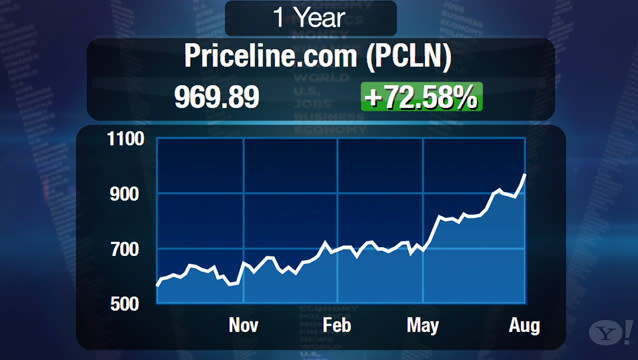Priceline Stock: Worth $1,000 a Share?

For a thousand bucks, a Web surfer today can book a round trip flight from New York to London in three weeks using Priceline.com – or, for the same $1,000, one could buy slightly more than a single share of Priceline.com (PCLN) stock.
How’s that for a rich bit of irony? Priceline.com, a company built on offering the lowest price for travel to distant places, is on the verge of becoming the first Standard & Poor’s 500 Index member (GSPC) to crack above a four-digit price.
Related: S&P 500 Is headed to 1750: Bank of America's Subramanian
Following better-than-expected earnings last Thursday, Priceline shares surged 5% higher on Friday, touching a high of $992, before settling back a bit into the $960s. That’s close enough for at least ten Wall Street analysts to place a price target of more than $1,000 on the stock, with the highest among them stretching to $1,200.
As Lauren Lyster and I discus in the attached video, there are at least three factors that have brought Priceline to this landmark level.
First is the company’s strong fundamental momentum. Led by the company’s Booking.com global hotel-reservations site in particular, Priceline earnings are on pace to rise 27% this year. Analysts project additional growth of 23% in 2014 to nearly $50 a share.
This kind of brisk profit growth has placed Priceline in a narrow elite class of coveted large-capitalization growth stocks that fetch premium valuations – but nothing like the sort of towering – or even infinite – price-to-earnings multiples that routinely were bestowed on dot-com stocks in the tech bubble of the late 1990s.
A second, and quite simple, explanation for the stock’s high nominal price is the fact that the company executed a one-for-six reverse stock split in 2003, after the shares had collapsed into the single digits in the early-2000s bear market. Adjusted for that reverse split, Priceline briefly hit a high of $974 in 1999, so the stock has made a long, dramatic round trip, making it one of the very few hot stocks of the original Internet bubble to have grown into its 1999 share price.
A final element of Priceline’s flirtation with $1,000 is the current trend for companies not to split their stock. As the Wall Street Journal’s MoneyBeat blog noted, only nine S&P 500 companies have split their shares this year, even as most trade near their historic highs. This fashion for high share prices can be seen in Google Inc. (GOOG) priced in the high $800s, MasterCard Inc. (MA) in the $630s and of course Apple Inc. (AAPL) in the $400s after having reached $700 last year.
Stock splits have always been mostly a cosmetic adjustment, the equivalent of slicing a pizza into 16 slices instead of eight. Studies have shown that they often represented a vague gesture of confidence by corporate management, while generating mostly pointless excitement among retail investors.
Yet there used to be a practical, mechanical reason to split a stock. In years gone by, small investors would get a lower trading commission if they bought a “round lot” of 100 shares, and a lower nominal stock price put such trades within more investors’ reach. These days, flat-rate online trading has removed even this consideration.
Beyond that, a high stock price has clearly become a matter of prestige among big companies, which has dragged the average price of a stock in the S&P 500 up to a record high above $70. That’s far above the $52 average at the 2007 stock-market peak, and is far above the $30-$50 average that prevailed for decades.
One small implication of this pattern: The widely cited issue of low trading volume, when measured in total shares exchanged, is not as much of an anomaly as many make it out to be. Dollar volume, thanks to all those pricey stocks, has actually been running close to its pre-financial-crisis average.
Tell Us What You Think!
Send an email to: thedailyticker@yahoo.com.
You can also look us up on Twitter and Facebook.
More from The Daily Ticker:
Paul Krugman is Right, It Turns Out, About 'Uncertainty'
Facebook is Ruining Facebook - Again: Here Come Video Ads
BlackBerry Going Private? Still Not a Good Time to Buy: Jeff Macke